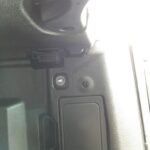For car enthusiasts looking to understand their vehicle’s performance, especially metrics like 0-60 mph acceleration, the combination of an OBD2 adapter and a smartphone app like Torque offers an accessible and insightful solution. Recently, I decided to explore this technology firsthand and was impressed by the results. Using a new OBD2 Bluetooth adapter, easily purchased online, and the Torque app from the Android store, I was able to accurately measure my car’s 0-60 time and delve into a wealth of other performance data.
Setting up the OBD2 adapter was incredibly straightforward. This compact device plugs directly into your car’s OBD2 port, typically located under the dashboard. Its small size is a significant advantage, allowing it to remain connected without obstructing legroom or interfering with normal driving. Pairing the adapter with my Android phone via Bluetooth was seamless and automatic, establishing a connection as soon as I started the car and launched the Torque app.
Eager to test the 0-60 mph capabilities, I found a safe, straight, and slightly downhill stretch of road. After a few practice runs to familiarize myself with the app, I conducted several tests in different driving modes. In normal driving mode, simply accelerating from a standstill, the Torque app consistently recorded 0-60 mph times of around 6.9 to 7.0 seconds. Experimenting with sport mode, surprisingly, yielded a slightly slower time of 7.5 seconds, confirming that for straight-line acceleration, standard mode is more efficient in my vehicle. I even attempted a run starting in manual “first gear” and quickly shifting to automatic, but this resulted in a slower 8-second time, suggesting this method isn’t optimal for my all-wheel-drive car.
Beyond 0-60 mph times, the Torque app provided a range of real-time data. Notably, it measured a peak horsepower of 162.7 hp at the wheels and a torque of 172.5 (units unspecified, likely lb-ft) . While the horsepower calculation relies on user-inputted vehicle parameters like engine displacement and weight, the figures seemed reasonably accurate and within the expected range for my car, especially considering my aftermarket cold air intake. For precise horsepower figures, a dynamometer test would be necessary, but for a portable, affordable tool, the Torque app offers impressive estimations. The 0-60 mph readings, derived directly from the car’s ECU speed sensor, are likely very accurate, possibly to within a tenth or even a hundredth of a second, surpassing the precision of most other DIY 0-60 measurement methods.
The Torque app’s capabilities extend far beyond just 0-60 and horsepower. It can monitor an extensive list of parameters, from individual cylinder fuel pressure and air-fuel ratios to temperature readings from various sensors. The data logging feature allows for later review and analysis, and the app supports sharing data via email or social media. For a combined cost of around $30 for the OBD2 adapter and the Torque app, this setup is an exceptional value for anyone interested in understanding their car’s performance and diagnostics in real-time. It’s a fun and informative tool that I plan to continue using to monitor my car’s condition and track the impact of any future modifications.
